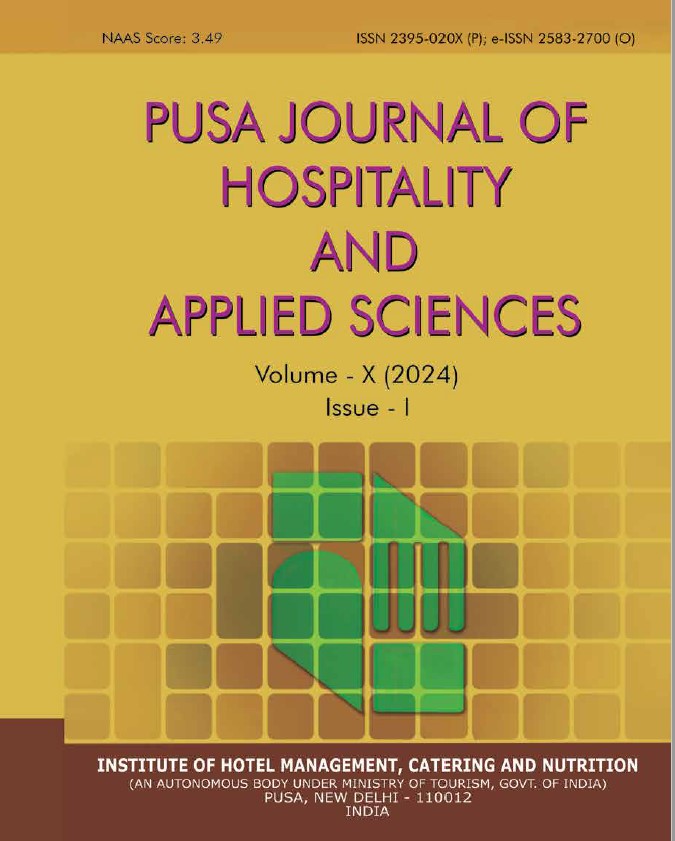The Influence of Job Satisfaction, Work Life Balance and Career Growth on Hospitality Professionals’ Transition to Allied Sectors
DOI:
https://doi.org/10.48165/pjhas.2025.11.1.11Keywords:
Hospitality professionals, job satisfaction, work-life balance, career growth, core hotel operations, allied sectors, career transitions, talent retention, hospitality workforce, professional motivationsAbstract
Background: The hospitality industry has traditionally offered dynamic career opportunities within core hotel operations. However, over the past decade, there has been a notable shift of hospitality professionals from core hotel roles to allied sectors such as event management, tourism and consulting. This career movement has raised concerns regarding the sustainability of talent retention within hotel operations. Understanding the key factors influencing this shift is essential for developing effective strategies to improve employee satisfaction and retention in the industry. Objective: The study aimed to examine the impact of job satisfaction, work-life balance and career growth opportunities on the career transitions of hospitality professionals from core hotel operations to allied sectors. It sought to identify the underlying motivations for these movements and explore potential measures that could help hotel management retain skilled professionals. Methodology: A quantitative research design was adopted. The study was conducted in urban hospitality hubs where career transitions are more prevalent. A total of 130 hospitality professionals who had moved from core hotel operations to allied sectors participated in a structured survey. The survey utilized a structured questionnaire focusing on job satisfaction, work-life balance, career growth opportunities and professional motivations. Data analysis was performed using descriptive and inferential statistics. Results: The findings indicated that job dissatisfaction, poor work-life balance and limited career growth opportunities were significant drivers of career shifts among hospitality professionals. A majority of respondents reported seeking roles in allied sectors due to better work-life balance, structured work environments and enhanced career mobility. The study also found that professionals were attracted to allied industries offering more defined career progression pathways and greater job stability. Additionally, qualitative insights highlighted the role of workplace culture, managerial support and personal aspirations in influencing career decisions. Conclusion: The study concluded that the hospitality industry must prioritize job satisfaction, work-life balance and career development opportunities to retain skilled professionals. Enhancing career growth prospects, implementing employee-friendly work schedules and fostering supportive work environments could mitigate the trend of professionals shifting to allied sectors. These insights provide valuable recommendations for hotel management and policymakers in developing effective retention strategies to sustain a competent and motivated workforce in core hotel operations.References
Baum, T. (2006). Human Resource Management for Tourism, Hospitality and Leisure. Thomson Learning.
Brownell, J. (2006). Organizational culture in the hospitality industry. International Journal of Hospitality Management, 25(4), 536–554. https://doi.org/10.1016/j. ijhm.2005.06.002
Brotheridge, C. M., & Lee, R. T. (2003). Development and validation of the emotional labour scale. Journal of Occupational and Organizational Psychology, 76(3), 365–379. https://doi.org/10.1348/096317903769647229
Deery, M., & Jago, L. (2009). A framework for work-life balance practices: Addressing the needs of the tourism industry. Tourism and Hospitality Research, 9(2), 97– 108. https://doi.org/10.1057/thr.2009.4
Demerouti, E., Bakker, A. B., Nachreiner, F., & Schaufeli, W. B. (2001). The job demands-resources model of burnout. Journal of Applied Psychology, 86(3), 499–512. https:// doi.org/10.1037/0021-9010.86.3.499
Gursoy, D., Maier, T. A., & Chi, C. G. (2008). Generational differences: An examination of work values and generational gaps in the hospitality workforce. International Journal of Hospitality Management, 27(3), 448–458. https://doi.org/10.1016/j.ijhm.2007.11.002
Karatepe, O. M., & Uludag, O. (2008). Role stress, burnout and work engagement among frontline hotel employees. International Journal of Contemporary Hospitality Management, 20(5), 561–580. https://doi.
org/10.1108/09596110810873525
Pizam, A., & Ellis, T. (1999). Customer satisfaction and its measurement in hospitality enterprises. International Journal of Contemporary Hospitality Management, 11(7), 326–339. https://doi.org/10.1108/09596119910293231
Smith, J., & Jones, R. (2011). Boot camp for lovers: Make love last forever: The survival course for relationships. CreateSpace Independent Publishing Platform.
Solnet, D., & Kralj, A. (2011). Generational differences in work attitudes: Evidence from the hospitality industry. Journal of Human Resources in Hospitality & Tourism, 10(1), 14–28. https://doi.org/10.1080/15332845.2010.5
00205
Williams, S. N., & Lee, L. (2020). Understanding Generation Z’s expectations of work: A review and future research agenda. Journal of Business and Psychology, 35(3), 1–17. https://doi.org/10.1007/s10869-019-09670-5
Wong, C. A., & Laschinger, H. K. (2013). Authentic leadership, performance and job satisfaction: The mediating role of empowerment. Journal of Advanced Nursing, 69(4), 947–959. https://doi.org/10.1111/j.1365-
2648.2012.06089.x




